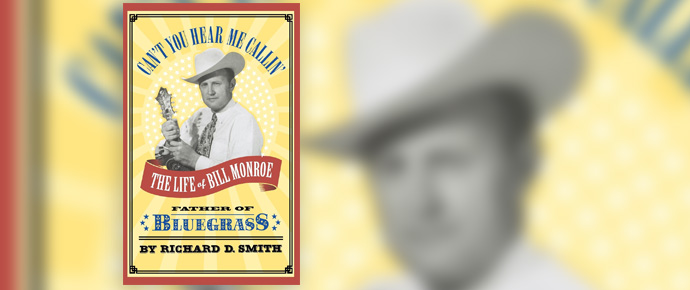
In an article/interview piece last week about a new Bill Monroe biography (Bill Monroe — The Life and Music of the Blue Grass Man), its author, Tom Ewing shared some thoughts about a previous Monroe book. The author, Richard D. Smith, wrote to respond. We include his comments in their entirety.
I read the article Blue Grass Man Out for Bill Monroe’s Birthday by Richard Thompson (posted September 14) with great interest — and even greater surprise.
You see, I’m the author of Can’t You Hear Me Callin’: The Life of Bill Monroe, Father of Bluegrass (Little, Brown & Co, hardcover; Pegasus Press, paperback), the unnamed book which inspired Tom Ewing (and not in a positive way, it seems) to write his own.
Tom relates: “I decided that I wanted to write about Bill’s life in 2000, after reading a biography that was ‘entertaining,’ but wholly inadequate when it came to explaining how he lived his life and developed his music.”
He’s entitled to his opinion, of course. But some would disagree about my efforts being inadequate or merely “entertaining.” My biography of Bill Monroe was honored as the Belmont University, Nashville, Country Music Book of the Year and with Second Prize in the Ralph J. Gleason Awards for Books on American Music. It also garnered for me IBMA Print Media Person of the Year in 2001. I remain deeply grateful for these and other honors.
Tom continues, “The writer of the afore-mentioned biography did a lot of jumping around from place-and-time to place-and-time, attempting to summarize or analyze, and I felt that this just confused matters. Telling the story from beginning to end, I believe, was the best way to begin to understand it.”
That’s an amazing statement, to put it mildly.
Yes, my book does contain analyses and historical summaries. These put Monroe’s life and times — and how he developed his music — in all-important context. But Can’t You Hear Me Callin’ does, in fact, tell Bill’s story from beginning to end.
The chapter titles prove this. For example: Chapter 1, “Blue Moon of Kentucky Rising (The Beginnings to 1920)”; Chapter 4, “Bluegrass (1945 to 1953)”; Chapter 7, “His Best Days on Earth (1965 to 1983)”; and Chapter 8, “Blue Moon of Kentucky Setting (1983 to 1996).”
Bluegrass Today contributor Richard Thompson (of whose writing I’m a great fan) includes this praise by Tom Adler for Ewing’s new book:
“There is a level of detail in this book that no one, not even the most faithful dyed-in-the-wool bluegrass fans are likely to have encountered previously. For instance, while most close followers of Monroe know he was born near Rosine, Kentucky, on September 13, 1911, how many of us already knew, for example, that he was born with the assistance of a midwife, at 10:30 in the morning? Or that on the day before his birth his forty-one-year-old mother Malissa was enduring that year’s extreme heat wave by sitting on her porch, bare-footed in an old loose dress, seeking relief by playing music?”
With all respect to Mr. Adler (a bluegrass stalwart if there ever was one), the many readers of Can’t You Hear Me Callin’ encountered this years ago. They read about the pregnant Malissa distracting herself in the sweltering heat by playing music and about the midwife because I wrote about them (pages 11 and 13).
Tom’s info about Bill being born at 10:30 in the morning is a great tidbit I didn’t have. But I did give a rundown of what else happened on the Monroe family farm that fateful September 13, 1911, as revealed in a ledger book kept by Bill’s daddy, J.B. “Buck” Monroe. So, I think I provided a serious level of detail myself.
Speaking of great tidbits, I’m told that Tom has calculated a close, maybe exact, date for another fateful morning; when Bill Monroe was strolling around a Florida town and saw a Gibson F-5 mandolin for sale in a barbershop window.
Of course, this proved to be THE Mandolin. Tom apparently had an ingenious method for determining this date, and I compliment him on it.
So, I have no problem giving credit where credit is due. I hope there will be lots to credit in Blue Grass Man. I wish Tom much success with it, and I have my own copy on order at my local bookstore. But of course, it’s disappointing this respect isn’t reciprocal.
I’m especially curious to see how he handles the vital topic of Bill’s “true songs.” It’s something I researched in some depth, although a few people (Tom prominent among them) later accused me of intruding into Bill’s private life.
But it was because of my admiration for Bill — and because it’s the first job of the biographer to be truthful — that I examined this with respect and honesty.
Why? There’s a stubbornly persisting view of Monroe as coming strictly out of folk traditions. But although he heroically kept traditional roots in country music (especially traditional-style fiddling), he was also a supremely inventive individual. He often drew on his life experiences to create his art.
I firmly believe that Bill Monroe was the first great autobiographical singer-songwriter in country music history. And I further believe that he remains among the greatest in overall American popular music.
Does anyone disagree?
Consider this: Even before Hank Williams, Bill wrote and recorded material directly inspired by his life and loves. If you ignore this, you simply cannot give Monroe his rightful place in history.
And these autobiographical “true songs” are among his most beloved. Some are joyous (Uncle Pen), some nostalgic (Memories of Mother and Dad), some brimming with fatherly affection (My Little Georgia Rose), and some filled with painful yearnings (On and On, Letter from My Darlin’, and — of course — the classic that inspired my book’s title).
I hope Tom hasn’t shied away from the stories behind the songs but has new revelations to share with us.
As I said, Can’t You Hear Me Callin’: The Life of Bill Monroe, Father of Bluegrass was honored with awards. But the real and positive proof of its value is when grassroots fans still come up and thank me, saying “I read your book and now I feel I know Bill Monroe, that I understand what he went through in his life.”







